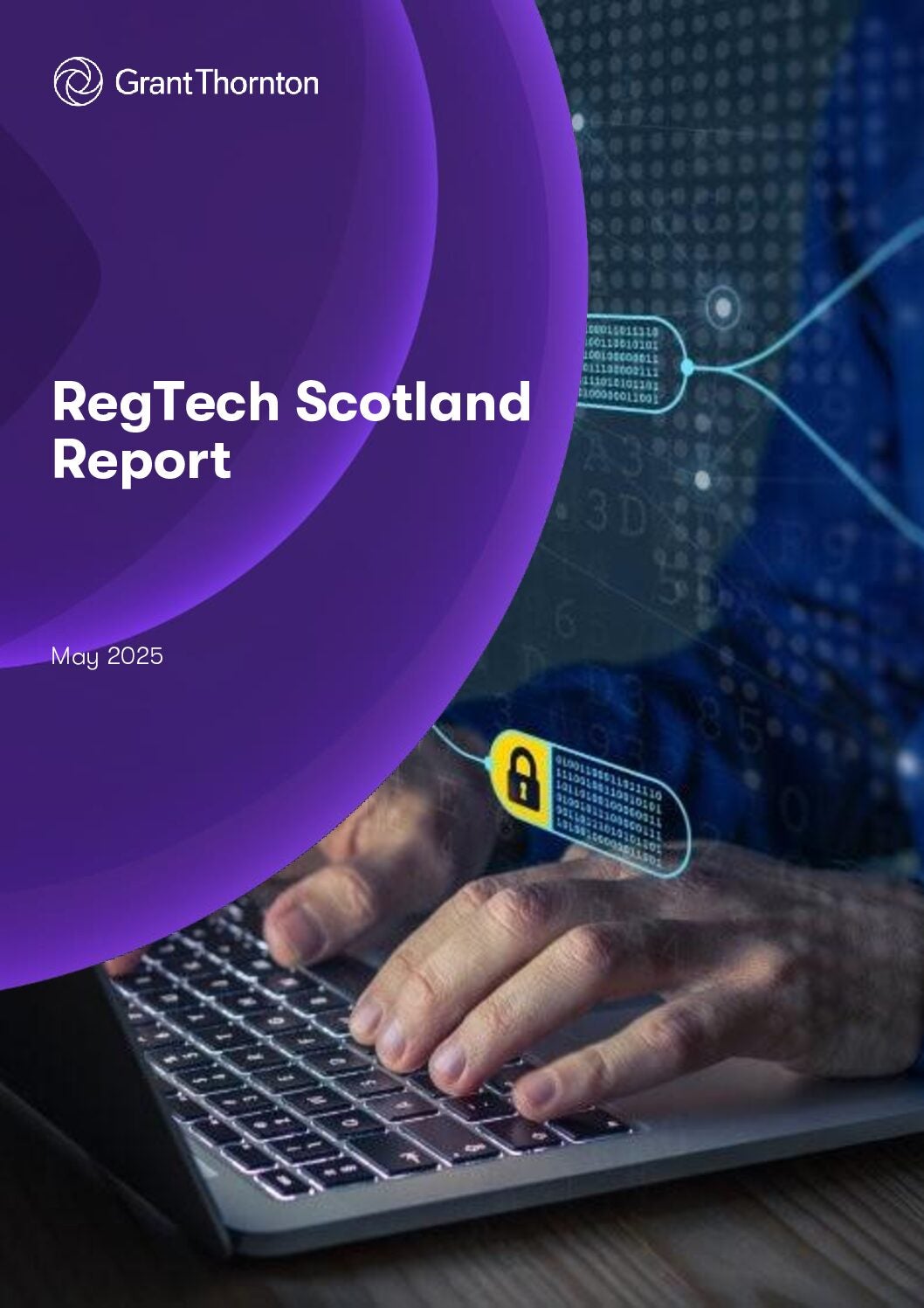
The trend of deregulation is gaining traction globally with regulations often cited as an obstacle to growth in many industries – yet RegTech developed in Scotland offers more practical solutions.
When used correctly, regulations offer greater legal protection for businesses and the public alike, decrease risk, improve quality standards, and reduce the potential for fraud.
However, it is crucial to strike a balance to ensure that regulations are working positively for businesses.
“It’s about dynamism versus stability. If you provide too much stability, you slow things down,” says Dr Devraj Basu, senior lecturer in finance at Strathclyde Business School. He also convenes the RegTech Forum, which brings together regulators and academics to discuss sector development in regular meetings.
“It’s a very delicate balance,” adds Basu. “Therefore, cooperation and collaboration become more important, as long as everyone’s aligned around the same goal – which is a healthy and innovative financial system.”
Rather than focusing on cutting regulations, businesses must develop strategies to manage them more effectively. This is where RegTech provides advantages. Businesses with diverse areas of expertise are emerging in Scotland, with a total of 41 RegTech companies identified nationally.
Defining RegTech and its applications
The term RegTech is self-explanatory, with technologies that simplify compliance with regulations. The origins of RegTech can be traced back to the early 1990s. But the financial crisis of 2008 renewed interest. A lack of regulations, or ineffective self-regulation, is often cited as a leading cause of the 2008 global banking crash. In the aftermath, financial businesses sought ways to simplify compliance with complex regulations.
“Basically, it is the use of technology and data to make compliance, and very importantly, assurance in the financial services sector – or any heavily regulated sector – cheaper, faster, but most of all better,” says Basu.
RegTech offers opportunities to free up resources and increase transparency and efficiencies for businesses, while building trust securely. For RegTech to be used most optimally, it is essential to engage with regulators.
The fintech ecosystem in Scotland has been of fundamental importance to the development of the RegTech sector, with FinTech Scotland a positive force for collaboration and growth.
The RegTech sector is now expanding across other industries in Scotland. Investments in RegTech have a track record of enhancing productivity. Health is one industry that stands to benefit from RegTech, with proven use cases of automation to accelerate the recruitment and applicant screening timelines.
Furthermore, applications of RegTech could help streamline processes and optimise productivity in manufacturing. Other sectors that could benefit from RegTech include energy, food and drink, and textiles. All these options are being explored in some capacity in Scotland.
Nevertheless, there can be challenges in long-established industries with many decades of regulations. However, in newer industries where regulations are still forming, there are opportunities for RegTech companies to help facilitate the development of standards. The space sector is one example of an industry where regulations are still developing, and RegTech could support the establishment of a practical framework.
How tech is accelerating onboarding and enhancing transparency for banks
RegTech companies in Scotland vary in size, from businesses with global operations to university spinouts just entering the market.
One global RegTech company with operations in Scotland is Encompass Corporation, which has recently moved to larger offices in Glasgow. The company is listed in the prestigious and globally recognised RegTech 100.
The company is a specialist provider of solutions to verify corporate digital identity (CDI) and meet know your customer (KYC) requirements in the onboarding process with business clients of larger banks, with a particular focus on cross-border banks. Checks are crucial to verify the identity of new customers to reduce risk for a bank when opening an account. Failure to have adequate KYC processes in place can result in significant fines running into the millions.
The KYC onboarding process can be lengthy and complex. The larger the corporation being onboarded, the more complicated the ownership structure typically is. Some corporations operate under multiple ownership structures across several jurisdictions.
“We identify what that corporate structure looks like. It’s called unwrapping,” says Dr Henry Balani, global head of industry and regulatory affairs at Encompass. “It’s all about identifying the ultimate beneficial owner,” he adds.
Onboarding processes can take an average of four to six weeks, sometimes even longer, forcing a business to wait for an account to be set up. Historically, onboarding processes were all performed manually, often requiring the same details to be provided multiple times on different forms.
However, Encompass solutions automate and accelerate these onboarding processes. What used to take weeks is now possible within a matter of hours. “It’s a significant step-change,” adds Balani.
There were many reasons that Encompass chose to have an office in Glasgow, says Balani, with one being the number of leading banks with a significant presence in the city. Banks benefit from the local support available to their operations.
Another deciding factor of being based in Glasgow was the opportunity to collaborate with academia and build connections with the government. In fact, former Scottish First Minister Nicola Sturgeon has previously visited the company’s offices and attended events.
“There is that level of cooperation, that willingness to partner and work with us,” adds Balani. “That’s why we’ve always felt that working in Scotland – and we’re based in Glasgow – was the right thing to do and continues to be right for us.”
Then there are the lower business running costs in Scotland compared with other locations around the world, coupled with a strong talent pool from financial services and the world-class universities.
Tech to combat fraud from AI impersonations and deep fakes
Along with international businesses, Scotland is also home to smaller start-ups and spinouts from its universities in the fintech and RegTech spaces. One of these companies is developing solutions that address an urgent issue in finance.
Phone calls were once considered a more secure method of authentication, particularly in banking. But recent high-profile cases of highly sophisticated AI voice impersonations and deepfake scams have highlighted the need for greater protection against fraud. Falling victim to such an attack may not only result in immediate financial losses, but also likely lead to severe financial penalties from the regulator.
“In a world of AI deep fakes and voice cloning, nothing is what it seems. We need a new way of confirming the counterparty we are speaking to,” says Dr Nanik Ramchandani, CEO of Lasting Asset, a Scottish start-up that is providing solutions.
Lasting Asset began as a crypto asset custody solution provider before shifting to focus on counter fraud. The company defines itself as a ‘trust tech’ company, but there are certain overlaps with the RegTech space. The company provides call-spoofing protection, alerting customers to who is calling them through secure cloud services to deliver real-time fraud detection.
One of the company’s two products is a peer-to-peer authenticator. The second product is enabling financial institutions to share data privately and securely without breaching GDPR, ensuring regulatory compliance and avoiding potential penalties.
Support for RegTech companies in Scotland
Support in Scotland from organisations such as Scottish Enterprise has enabled innovative RegTech companies to develop and scale up operations nationally and even internationally.
Ramchandani has supported two tech startups from Edinburgh Napier University, acting as a commercial champion for more than three years. He has helped academics translate their technologies into business ideas. Both startups received vital funding grants from the Scottish Enterprise High Growth Spinout Programme (HGSP).
Having lived and worked in various locations around the world, Ramchandani speaks very highly of the support available in Scotland and the opportunities facilitated by the fintech and RegTech ecosystems.
“I’ve lived in multiple parts of the world, from Asia, Singapore, and Dubai to the US, Geneva, and France. I’ve found that in terms of support to startups, Scotland is possibly one of the best places in the world for early stage support, especially for startups coming out of universities or academics building innovative technology,” he says. “The Scottish Enterprise High Growth Spinout Programme is probably second to none.”
A further strength is the presence of regulators in Scotland, offering an opportunity to collaborate and develop RegTech solutions for adoption in different industries.
Regulators with offices in Scotland include the Financial Conduct Authority (FCA), the Information Commissioner’s Office (ICO), the Competition and Markets Authority (CMA), and the Health and Safety Executive. There are also Scottish bodies for industries such as energy, transport, and housing.
Given the positive environment, extensive support, connections and collaboration opportunities available in Scotland, RegTech companies are primed for future growth while developing innovative solutions to meet the pressing industry needs of today.
To learn more about RegTech in Scotland, download the document below.





